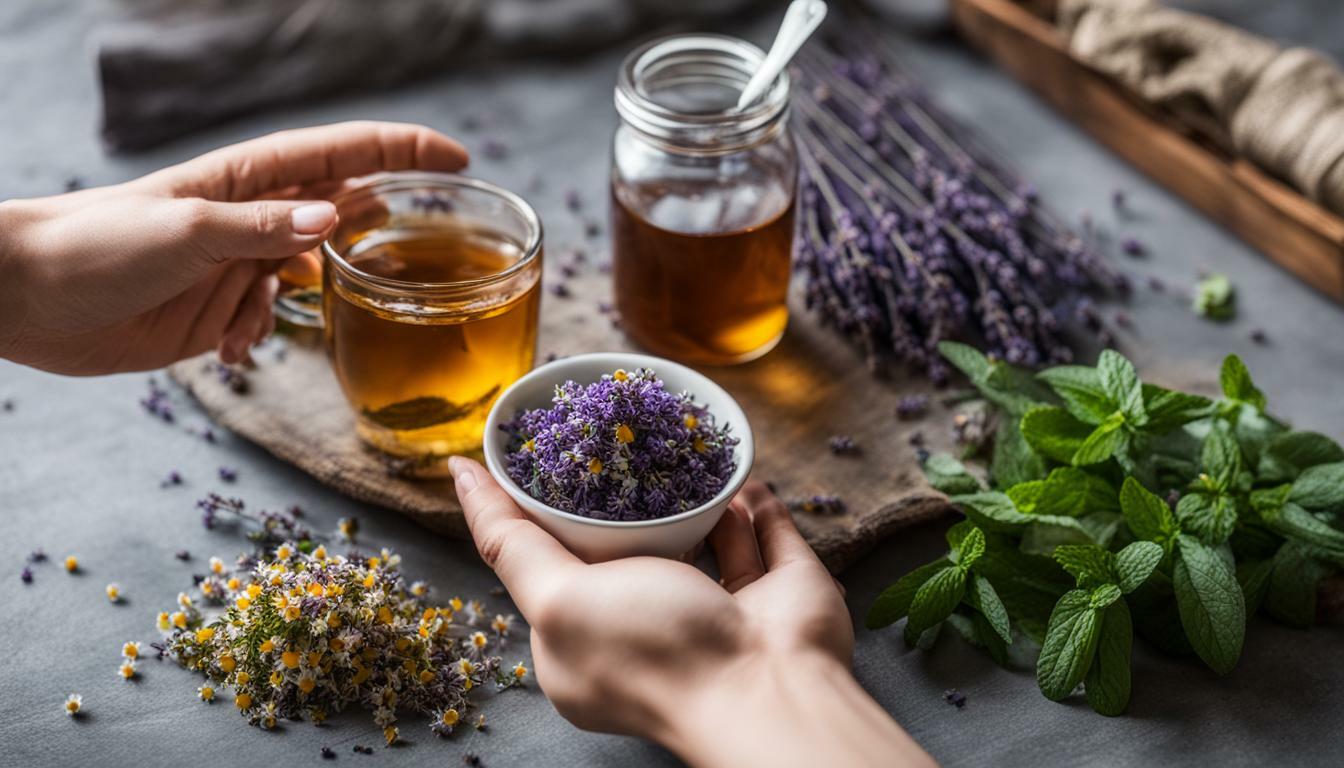Are you struggling to get a good night’s sleep? Discover the power of herbal medicine for insomnia and explore natural remedies that can help you sleep better.
Several herbal remedies can help improve sleep quality, but they should not replace good sleep habits. Natural sleep aids, such as melatonin, magnesium, valerian root, lavender, passionflower, and chamomile can promote better sleep.
Key Takeaways:
- Melatonin is a hormone that can improve sleep quality and duration, especially for individuals with disrupted sleep cycles.
- Valerian root may improve sleep quality, but results are inconsistent.
- Magnesium helps relax the mind and body, regulates melatonin production, and increases levels of calming neurotransmitters.
- Aromatherapy with lavender can improve sleep quality, while passionflower and chamomile may slightly improve sleep quality in some individuals.
- Consult with a healthcare professional before using herbal remedies for insomnia to minimize potential side effects and risks.
Remember, incorporating good sleep practices, such as keeping the bedroom cool, avoiding exposure to bright lights, and regular exercise, can also contribute to better sleep. Take advantage of the power of herbal medicine and find the natural remedies that work best for your individual sleep needs.
Understanding Insomnia and Its Impact on Sleep
Insomnia can severely impact your quality of sleep, leaving you tired and irritable throughout the day. Explore alternative treatments and herbal supplements that can provide relief from sleeplessness. Several herbal remedies can help improve sleep quality, but it’s important to note that they should not replace good sleep habits.
Natural sleep aids, such as melatonin, magnesium, valerian root, lavender, passionflower, and chamomile, have been shown to promote better sleep. Melatonin, a hormone that signals the brain to sleep, can improve sleep quality and duration, especially for individuals with disrupted sleep cycles like shift workers. Valerian root, often used for anxiety and depression, may also improve sleep quality, but results are inconsistent.
Magnesium helps relax the mind and body, regulates melatonin production, and increases levels of calming neurotransmitters. Lavender aromatherapy has been shown to improve sleep quality, while passionflower and chamomile may slightly improve sleep quality in some individuals. It’s important to note that herbal remedies, like any medications, can have side effects and risks, so it’s best to consult with a healthcare professional before use.
Additionally, incorporating good sleep practices, such as keeping the bedroom cool, avoiding exposure to bright lights, and regular exercise, can also contribute to better sleep. Taking natural sleep aids can provide relief, but it’s essential to explore and consider various remedies to find what works best for individual sleep needs.
| Herbal Remedies | Benefit |
|---|---|
| Melatonin | Improves sleep quality and duration |
| Valerian Root | May improve sleep quality, results vary |
| Magnesium | Relaxes mind and body, regulates melatonin production |
| Lavender, Passionflower, and Chamomile | May improve sleep quality through aromatherapy |
“Insomnia is a common sleep disorder that affects millions of people worldwide. The use of herbal supplements to promote better sleep has gained popularity, offering a natural alternative to traditional medications. However, it’s essential to approach herbal remedies with caution and consult with a healthcare professional to ensure safety and effectiveness.” – Sleep Specialist
Remember, finding the right solution for your sleep needs may take time and experimentation. Incorporating herbal remedies alongside good sleep practices can help you achieve a restful night’s sleep and wake up feeling refreshed and rejuvenated.

Discover the power of melatonin, an herbal sleep aid that can help regulate your sleep-wake cycle and promote better sleep quality. Melatonin is a hormone produced naturally in the body by the pineal gland in response to darkness, signaling to the brain that it’s time to sleep. However, factors such as stress, travel, and exposure to artificial light can disrupt melatonin production, leading to difficulty falling asleep or staying asleep.
Supplementing with melatonin can help restore balance to your sleep-wake cycle, making it an effective natural remedy for insomnia. Research has shown that melatonin supplementation can improve sleep quality and duration, especially for individuals with disrupted sleep patterns, such as shift workers or those suffering from jet lag. It is important to note that melatonin is most effective when taken at the correct dosage and at the appropriate time, typically 30 minutes to 1 hour before bedtime.
Incorporating melatonin as part of your sleep routine can help regulate your sleep patterns and promote better sleep. However, it’s crucial to consult with a healthcare professional before using melatonin or any other herbal sleep aid. They can provide guidance on the appropriate dosage, potential interactions with other medications, and any potential side effects. Remember, individual responses to melatonin may vary, so it’s essential to find the right dosage and timing that works best for your sleep needs.
The Benefits of Melatonin as an Herbal Sleep Aid
| Benefits | Usage | Precautions |
|---|---|---|
| Regulates sleep-wake cycle | Take 30 minutes to 1 hour before bedtime | Consult with healthcare professional for appropriate dosage and to check for any interactions |
| Improves sleep quality | Supports individuals with disrupted sleep patterns | Avoid use during pregnancy and breastfeeding |
| Reduces time to fall asleep | Enhances sleep duration | May cause drowsiness, so avoid driving or operating heavy machinery after taking |
Melatonin, when used correctly and under professional guidance, can be a valuable tool in promoting better sleep. Remember to consult with a healthcare professional and incorporate good sleep practices to support your overall sleep health. By understanding the potential benefits and precautions of melatonin as an herbal sleep aid, you can make informed decisions about your sleep routine and improve your sleep quality.

Uncover the soothing properties of valerian root, a herbal remedy that has been used for centuries to promote relaxation and enhance sleep. Valerian root is a popular choice for individuals seeking a natural alternative to pharmaceutical sleep aids. It is derived from the root of the Valeriana officinalis plant and is commonly available in supplement form.
Valerian root works by increasing the levels of gamma-aminobutyric acid (GABA) in the brain, a neurotransmitter that helps to calm the nervous system and reduce anxiety. Additionally, it may inhibit the breakdown of GABA in the brain, prolonging its calming effects. This makes valerian root an effective option for those experiencing restlessness or anxiety that interferes with sleep.
Studies have shown that valerian root can improve sleep quality and reduce the time it takes to fall asleep. However, results can vary from person to person. Some individuals may experience significant improvements in sleep, while others may not notice a significant difference. It is important to note that valerian root is generally considered safe for short-term use, but long-term use or high doses may result in side effects such as headaches, stomach discomfort, or daytime drowsiness.
“Valerian root is a natural remedy that has been used for centuries to promote relaxation and enhance sleep.”
| Benefits of Valerian Root |
|---|
| Promotes relaxation |
| Reduces anxiety and restlessness |
| Improves sleep quality |
| Shortens the time it takes to fall asleep |
When using valerian root as a sleep aid, it is recommended to start with a low dose and gradually increase as needed. It is also advisable to take it about an hour before bedtime for optimal results. However, it is important to consult with a healthcare professional before incorporating valerian root into your sleep routine, especially if you are taking any other medications or have underlying health conditions.
In conclusion, valerian root can be a beneficial herbal remedy for improving sleep quality and promoting relaxation. Its natural calming properties make it an attractive alternative to traditional sleep aids. However, individual experiences may vary, and it is crucial to consult with a healthcare professional before incorporating valerian root or any other herbal remedies into your sleep routine.

Experience the calming effects of magnesium, a herbal supplement that can help relax your mind and body, leading to a more restful night’s sleep. Magnesium plays a vital role in promoting relaxation by regulating the neurotransmitters that influence sleep patterns. It is involved in the production of melatonin, the hormone responsible for signaling the brain to sleep. By increasing melatonin levels, magnesium can help improve sleep quality and duration, especially for individuals struggling with insomnia.
In addition to its role in melatonin production, magnesium also helps relax the mind and body. It acts as a natural muscle relaxant, reducing muscle tension and promoting a sense of calmness. This relaxation effect can be particularly beneficial for individuals who experience anxiety or have difficulty unwinding before bed.
Studies have shown that magnesium supplementation can improve sleep quality and reduce the time it takes to fall asleep. According to a meta-analysis published in the Journal of Research in Medical Sciences, magnesium supplementation was associated with significant improvements in sleep duration and sleep efficiency. Another study published in the Journal of Research in Medical Sciences found that magnesium supplementation significantly improved sleep quality and reduced insomnia symptoms.
To incorporate magnesium into your sleep routine, consider taking herbal supplements that contain magnesium. These supplements are widely available and can easily be added to your daily routine. It’s important to note that individual needs may vary, so start with a lower dose and gradually increase if necessary. As with any herbal remedy, it’s best to consult with a healthcare professional before starting supplementation to ensure it is safe and appropriate for your specific needs.
| Tips for Incorporating Magnesium into Your Sleep Routine |
|---|
| 1. Take a magnesium supplement approximately 30 minutes before bedtime. |
| 2. Look for herbal supplements that contain magnesium, specifically targeting sleep support. |
| 3. Prioritize relaxation techniques, such as meditation or gentle stretching, to enhance the calming effects of magnesium. |
| 4. Create a relaxing bedtime routine, such as reading a book or taking a warm bath, to further promote relaxation and prepare your mind and body for sleep. |
Summing It Up
Magnesium is a herbal supplement that can help relax your mind and body, leading to improved sleep quality. It regulates melatonin production, promotes relaxation, and reduces muscle tension. Incorporating magnesium into your sleep routine through herbal supplements can be an effective way to support better sleep. Remember to consult with a healthcare professional before starting any new supplements, and consider implementing relaxation techniques and a calming bedtime routine to enhance the effects of magnesium.

Indulge in the soothing scents of lavender, passionflower, and chamomile to create a calming atmosphere that can help you achieve a deeper and more peaceful sleep. Aromatherapy has long been used as a natural remedy for insomnia, harnessing the power of plant extracts to promote relaxation and improve sleep quality. These three herbal sleep aids have been recognized for their calming properties and can be incorporated into your nightly routine to enhance your sleep experience.
Lavender, with its delicate purple blooms and sweet floral scent, has been extensively studied for its sleep-promoting effects. Research has shown that inhaling lavender essential oil can reduce anxiety and increase the quality of sleep. In a study published in the journal *Evidence-Based Complementary and Alternative Medicine*, participants who inhaled lavender essential oil experienced improved sleep quality and felt more refreshed upon waking.
Similarly, passionflower and chamomile have been used for centuries to relax the mind and induce sleep. Passionflower has been traditionally used as a sedative, providing relief for those with anxiety and insomnia. Chamomile, known for its calming properties, can help alleviate stress and promote a sense of tranquility. Both herbs can be enjoyed as herbal teas or incorporated into essential oil blends for aromatherapy.
| Herbal Sleep Aids | Benefits |
|---|---|
| Lavender | Reduces anxiety and improves sleep quality |
| Passionflower | Relaxes the mind and promotes sleep |
| Chamomile | Calms the nerves and induces relaxation |
When using these herbal remedies for insomnia, it’s important to follow safe practices. Always dilute essential oils before use and conduct a patch test to check for any adverse reactions. If you’re considering using herbal teas, consult with a healthcare professional to ensure there are no interactions with other medications you may be taking. Remember, while aromatherapy can enhance your sleep environment, it should be used in conjunction with good sleep habits, such as maintaining a consistent sleep schedule, creating a comfortable sleep environment, and avoiding stimulating activities before bed.

By incorporating the calming scents of lavender, passionflower, and chamomile into your nighttime routine, you can create a restful environment that supports deep and rejuvenating sleep. Whether it’s through inhaling their delightful aromas or sipping on a cup of herbal tea, these natural sleep aids can help relax your mind and body, allowing you to drift off into a blissful slumber. Sweet dreams await!
The Importance of Consultation and Good Sleep Practices
Before incorporating herbal remedies into your sleep routine, it’s essential to consult with a healthcare professional to ensure their suitability for your individual needs. Alternative treatments for insomnia, such as herbal supplements, can interact with medications or have potential side effects, so it’s important to have expert guidance.
In addition to consultation, implementing good sleep practices can significantly enhance the effectiveness of herbal supplements for better sleep. Creating a conducive sleep environment by keeping the bedroom cool, dark, and quiet can promote relaxation and help induce sleep. Avoiding exposure to bright lights, especially from electronic devices before bedtime, can also support better sleep.
Regular exercise is another crucial aspect of a healthy sleep routine. Engaging in physical activity during the day can help regulate your sleep-wake cycle and promote deeper, more restful sleep at night. However, it’s important to note that exercising too close to bedtime can have the opposite effect and make it harder to fall asleep.
By combining the use of herbal supplements with these good sleep practices, you can optimize your chances of achieving a more restful sleep. Remember, everyone’s sleep needs are unique, so it may take some experimentation to find the right herbal remedies and routines that work best for you. Consulting with a healthcare professional will give you personalized guidance and ensure you’re on the right path to a better night’s sleep.
FAQ
Can herbal remedies completely replace good sleep habits?
No, herbal remedies should not replace good sleep habits. They can provide relief, but maintaining healthy sleep practices is essential for better sleep.
What are some natural sleep aids that can promote better sleep?
Some natural sleep aids include melatonin, magnesium, valerian root, lavender, passionflower, and chamomile.
How does melatonin improve sleep quality?
Melatonin is a hormone that signals the brain to sleep. It can improve sleep quality and duration, especially for individuals with disrupted sleep cycles like shift workers.
Can valerian root improve sleep quality?
Valerian root, often used for anxiety and depression, may improve sleep quality, but results are inconsistent.
What are the benefits of magnesium for sleep?
Magnesium helps relax the mind and body, regulates melatonin production, and increases levels of calming neurotransmitters.
Does lavender aromatherapy improve sleep quality?
Yes, lavender aromatherapy has been shown to improve sleep quality.
Can passionflower and chamomile improve sleep quality?
Passionflower and chamomile may slightly improve sleep quality in some individuals.
Are there any side effects or risks associated with herbal remedies?
Yes, like any medications, herbal remedies can have side effects and risks. It is best to consult with a healthcare professional before use.
What are some good sleep practices to incorporate?
Good sleep practices include keeping the bedroom cool, avoiding exposure to bright lights, and regular exercise.
Yes, it is essential to explore and consider various remedies to find what works best for individual sleep needs.




